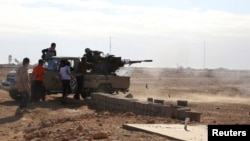Libyan TV is reporting that fighting resumed Tuesday around the oil exporting port of Sidra, between fighters claiming loyalty to the Islamic State (IS) group and Libya's petroleum infrastructure force. Seven people were reported killed and 25 others wounded during battles Monday.
A fire raged at a petroleum storage tank in Sidra Tuesday, struck by a missile reportedly fired by IS militants west of the town. Another oil storage tank was set ablaze in nearby Ras Lanuf Monday after IS attacked forces protecting the facility.
Mohammed al Harari, a spokesman for the Libyan National Oil Company in Tripoli, told Libya li Kul Ahrar TV that fighting was preventing firefighters from quelling the flames.
He said that fire and smoke continue to pour from a 500,000 barrel crude oil storage tank in Sidra, and a pipeline between tanks. He adds that fire crews with the Waha Oil Company, which operates the port, have been unable to tackle the fires due to ongoing clashes.
Militants claiming allegiance to the IS group attacked Ras Lanuf Monday with rockets and multiple suicide car bombs, killing at least seven oil company security guards. IS fighters later reportedly withdrew to the nearby town of Ben Javad.
Libya's “oil triangle” near the eastern capital of Benghazi is the country's most valuable economic asset. Competing militias control vast swathes of territory, and are beyond the control of the two rival governments vying for dominance.
Hilal Khashan, who teaches political science at the American University of Beirut, said that gaining control of Libya's oil facilities could give the IS major clout over the rest of the country.
"Libyans know that whoever controls the country's oil can control Libya. [But I don't] think that ISIS has a chance of controlling the country's resources because sentiment in either the east or west is averse to ISIS,” Khashan said, using another acronym for the Islamist extremist group. “The real threat is al-Qaida," he added.
Khashan argues that Libyans “will side with al-Qaida against ISIS and in due time they will turn against al-Qaida.” He also stressed that Libyans “for the most part are not militant Islamists."
Libya's oil production has reportedly fallen to less than a quarter of the 1.6 million barrels per day it averaged before the start of the 2011 revolt against the country’s late strongarm leader Moammar Gadhafi.




